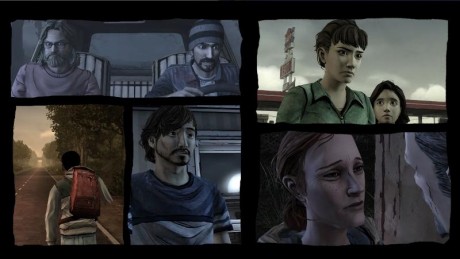
Take a look at the launch trailer for The Walking Dead: 400 Days. It”s a gold standard for terse narrative efficiency. In the span of each two-to-three-hour episode, you’d learn to love, hate, and feel everything in between about its ever-shifting cast of desperate, conflicted survivors.
Take three hours of the similarly high-concept zombie apocalypse drama The Last of Us and you’ll see its leads travel from one goon-filled building to another with only a few meaningful character and plot interactions sprinkled in between. With its minimalist controls, lack of combat, and only the slightest hint of a puzzle to intrude upon The Walking Dead’s slyly authored narrative, it’s managed to cram in full stories in the time it takes most games to teach you how to crouch.
Season’s One’s 400 Days DLC takes this concept one step further by inserting the player into five roughly 15-minute stories set at a highway rest stop. With its off-kilter chronology, suspenseful scenarios, and interweaving plotlines, 400 Days recalls the classic 90s movie Pulp Fiction. It works, to a point – but it’s difficult to shake the impression this format isn’t suited to the series’ strengths.
Part of what made The Walking Dead so special was that it had well-defined, complex characters who evolved over time, yet it told its story entirely through Lee’s point of view, so you never quite got a sense of the world beyond what he’d seen first hand. 400 Days pulls back the curtain a bit to show how other folks are coping (or not coping) with things.